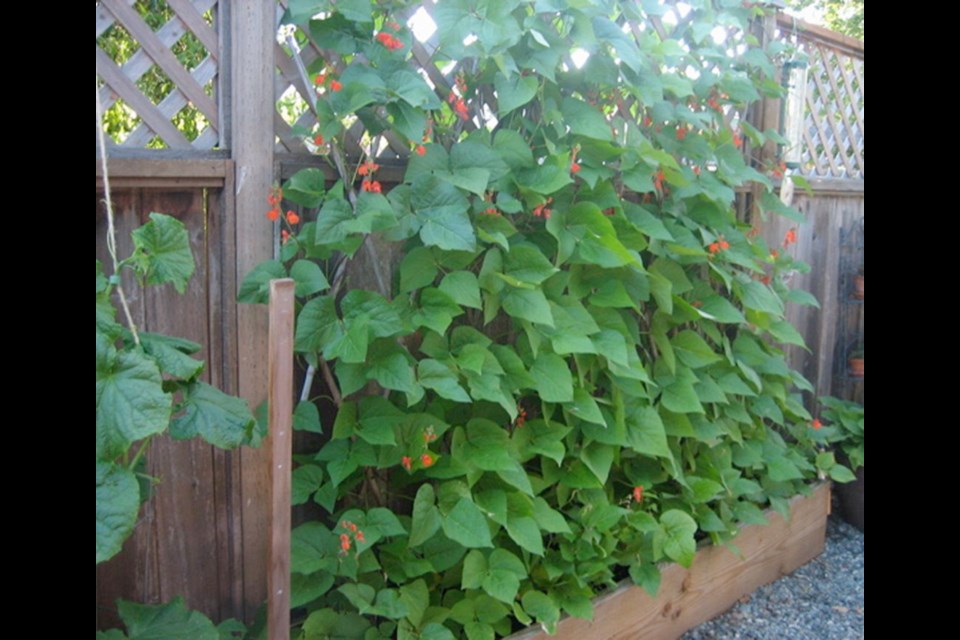Dear Helen: I’ve been having problems with runner bean plantings not setting pods. It’s a puzzle, because the pole beans always grow and produce well. I am presuming that runner and pole beans have similar requirements.
L.E.
Dear L.E.: Runner beans are botanically distinct as a separate species from pole and bush beans, which both require warm, fairly dry conditions to germinate successfully and develop productively.
Runner beans prefer cool summer conditions with a cool root run and consistently ample soil moisture. The vines are notorious for shedding their blossoms in hot summers like the one we had last year.
Runner beans, despite these issues, are highly desirable for their generally richer, deeper bean flavour than that of bush and pole beans.
Another difference is that runner beans require pollination, mainly by bees, to set their flat, tasty pods.
Dear Helen: When I went into the garden during a period of freezing weather, hoping to gather some kale for dinner, I found the leaves frozen solid. Should I be picking at that point?
A.C.
Dear A.C.: No. Wait until temperatures rise above freezing and the kale foliage returns to normal before picking. Letting the plants regain their normal processes will ensure a picking of kale that will deliver its usual, desirable texture and flavour.
Dear Helen: What is insect netting and how is it different from the spun polyester floating row covers I’ve always used to protect carrots from the carrot rust fly, onions from onion flies and beets and spinach from leaf miner flies?
P.S.
Dear P.S.: A floating row cover (horticultural fleece, Remay) is a gauze-like, extremely lightweight spun polyester fabric that is placed directly over seeded beds and plantings and anchored securely into the soil around the plantings to exclude insect pests and also to provide some protection against cold temperatures. I’ve observed that this type of cover hastens spring growth in vegetable plantings because of the additional warmth concentrated inside the fabric.
Insect netting such as ProtekNet is a durable, knitted poly fabric that allows free passage of air through to covered plantings. It does not gather warmth around the plants. The netting should be supported on hoops or smooth frames over vegetable plantings, but it can be used to cover fruiting bushes and small trees without any supporting framework.
With care, insect mesh lasts for many years. Floating row covers usually last for two, maybe three years.
Hopefully, more garden centres will carry insect netting this year. Russell Nursery in North Saanich and Dinter Nursery in Duncan have been selling it.
A Canadian supplier of ProtekNet is Dubois Agrinovation in Quebec. duboisag.com.
Dear Helen: I was intrigued by a column item mentioning EM. Is this product widely available?
B.C.
Dear B.C.: I believe that Activated Effective Micro-organisms are becoming more widely available. At my most recent visit to a Buckerfield’s store, just before Christmas, I noticed bottles of EM for pet and farm use as well as for the garden. The activity of this product’s mix of micro-organisms promotes availability of micro-nutrients to plants and helps to control pathogens. EM can be used on soils and compost heaps and as a foliar spray.
Alongside the EM was another product called Bokashi, from Cowichan Compost. Like EM, Bokashi was developed in the Far East.
The Bokashi I saw is made from the by-products of grain processing that are inoculated with food-grade beneficial bacteria to create a sweet-smelling compost accelerator that helps to eliminate odours, control pathogens and restore bacterial balance in compost.
Look for more information on these and other natural products that help us garden in healthful ways at cowichancompost.com and gardenerspantry.ca.
GARDEN EVENT
The year-round food garden. Russell Nursery, 1370 Wain Rd. in North Saanich, is presenting Planning for a 12-Month Harvest with well known local garden educator, entomologist and author Linda Gilkeson on March 7, at 9:30 a.m. at the nursery. This will be a very popular class and space is limited. Reserve a place by phoning 250-656-0384 or by sending an email to [email protected]. Include your phone number. The nursery is closed until Feb. 1, but there will be people on hand this month to check email and phone messages. Learn how to manage your garden to maximize production and grow fresh food all year long. russellnursery.com.



